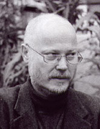Matthias Schmidt (born 1966) is a German musicologist.
Matthias Schmidt (born 1966) is a German musicologist.
Born in Cologne, Schmidt studied musicology, Germanistic, history of art and philosophy in the universities of Bonn, Berlin and Vienna. He received his doctorate at the FU Berlin and habilitated at the University of Salzburg. Schmidt was a research assistant at the Arnold Schönberg-Institute of the University of Music and Performing Arts Vienna, the German Academic Exchange Service, and the Österreichische Forschungsgemeinschaft scholarships in Austria, Italy and several times in the USA. Schmidt has spent many years of teaching (as lecturer, substitute and visiting professor) at universities in Austria, Switzerland, Germany and the Netherlands in addition to his academic duties as music journalist, exhibition curator and concert dramaturg. He has been editor of the series of publications of the International Schönberg Society and since 2006 (together with Klaus Pietschmann and Wilhelm Seidel) of the journal Musiktheorie.
Since 2007 Schmidt has been "titular professor" in the field of modern music history at the Musicology Department of the University of Basel . He is a board member of several foundations and forums, 2010-2017 he was a member of the board of directors of the NCCR Eikones (Basel). In 2017 Schmidt was elected to the Austrian Academy of Sciences.
Schmidt's work focuses on the history and aesthetics of music of the 18th to 20th centuries (books on Wolfgang Amadeus Mozart, Johannes Brahms, Arnold Schönberg and Ernst Krenek, among others). Schmidt is also particularly interested in persons and phenomena that lie beyond canonized historiography: for example, he has worked together with students on exhibitions and publications on the composers Felix Weingartner and Yevgeny Gunst as well as on the Swiss origins of the national anthem of Lesotho.
The Viennese musicologist Elisabeth Haas has made an attempt to give Schmidt's book Komponierte Kindheit a thorough critique. In Die Musikforschung Haas argues that Schmidt ignores widely used sources and uses the thoughts of others for his own. [1] But where Schmidt relied on himself, there were numerous mistakes in his explanations, each of which testified to insufficient knowledge of the music texts. [2] However, in the same issue of Die Musikforschung Schmidt was able to refute the criticism in a counterstatement and the accusations contained therein. [3]

Aribert Reimann was a German composer, pianist, and accompanist, known especially for his literary operas. His version of Shakespeare's King Lear, the opera Lear, was written at the suggestion of Dietrich Fischer-Dieskau, who performed the title role. His opera Medea after Grillparzer's play premiered in 2010 at the Vienna State Opera. He was a professor of contemporary Lied in Hamburg and Berlin. In 2011, he was awarded the Ernst von Siemens Music Prize for his life's work.
Reinhold Brinkmann was a German musicologist.

Hermann Zilcher was a German composer, pianist, conductor, and music teacher. His compositional oeuvre includes orchestral and choral works, two operas, chamber music and songs, études, piano works, and numerous works for accordion.
Manuel Gervink is a German musicologist and scholar who has worked at the Universities of Cologne and Dresden.

Bernhard R. Appel is a German musicologist. His research focuses on the life and work of the composer Robert Schumann, music history of the 18th and 19th centuries, Ludwig van Beethoven's works, compositional creative processes as well as methodology, theory and practice of music philology, in particular genetic textual criticism and digital music edition. In addition, Appel deals with the history of the viola da gamba.
Axel Beer is a German musicologist. He has been teaching at the Johannes Gutenberg University Mainz since 1995.
Giselher Schubert is a German musicologist.
Christian Martin Schmidt is a German musicologist and music theorist.

Dieter Rexroth was a German musicologist, dramaturge and cultural manager. He was intendant of the Deutsches Symphonie-Orchester Berlin from 1996, responsible also for choirs and orchestras in Berlin. He worked for major festivals including Frankfurter Feste at the Alte Oper, Young Euro Classic in Berlin and the Kasseler Musiktage. He wrote or edited books about composers including Paul Hindemith, Hans Werner Henze and Wolfgang Rihm.
Elmar Budde is a German musicologist. He studied at the Universität der Künste Berlin.
Hermann Danuser is a Swiss-German musicologist.
Gösta Neuwirth is an Austrian musicologist, composer and academic teacher. He studied in Vienna and Berlin, where he wrote a dissertation on harmony in Franz Schreker's Der ferne Klang. He has taught at universities and music schools including the Musikhochschule Graz, University of Graz, Hochschule der Künste Berlin and University of Freiburg. His compositions include a string quartet and a chamber opera.
Siegfried Schmalzriedt was a German musicologist, University lecturer and vice-rector of the Hochschule für Musik Karlsruhe.
Hans Joachim Marx is a German music historian. He has been professor of European music history at the University of Hamburg.
Matthias Herrmann is a German musicologist and university professor.
Arno Forchert was a German musicologist.
Friedhelm Krummacher is a German musicologist.
Gerd Rienäcker was a German musicologist.
Wolf Frobenius was a German musicologist and lecturer, who taught at the Saarland University.
Peter Sühring is a German musicologist, publicist and music critic.